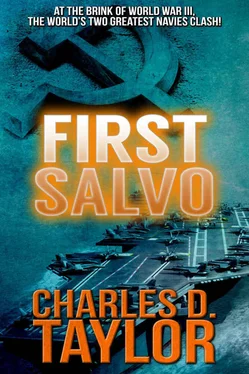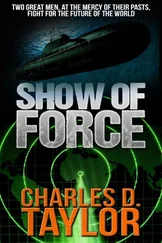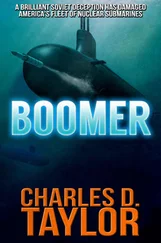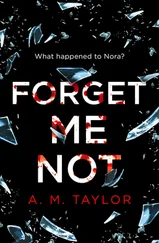“Sounds simple,” remarked Bush.
“Very,” agreed Ryng, “if you believe no one else is going to come running as soon as the shooting starts.”
An overhead speaker in the Yorktown ’s pilothouse crackled into life. “Permission granted to detach for maneuvering exercises. Request you maintain standard ECM and long-range AA guards per my Op Order 12-2. Over.”
“Roger. I thank you. Out.” Tom Carleton handled the transmission himself, since the maneuvering exercises were for no one other than him. The man he relieved hours earlier had assured him that his OODs were superb ship handlers, so it was apparent that only Yorktown ’s new captain needed to be qualified in handling the cruiser.
“This is Captain Carleton. I have the conn,” he called out to the bridge watch, following the Navy’s time-honored tradition. The acknowledgment echoed back to him, then he said, “Right standard rudder… come to course one zero zero.” He eased his well-fed bulk out of the captain’s chair and moved calmly about the pilothouse to refamiliarize himself with the myriad dials and displays.
Before putting his ship through her paces, he would take her about five miles outside the perimeter of the formation. The process wouldn’t be a long one. Carleton had commanded ships before, and he was a superb ship handler — any ship, any sea conditions. His purpose was simply to get the feel of Yorktown , to know before he gave an order how she would respond, how quickly she could accelerate, how she reacted in tight turns at high speeds. He had to know her personally not only under combat conditions, but also in close quarters with other U.S. ships.
Each vessel had a personality of its own. Though they were built following the same specifications, they were as different as human beings, each rudder biting just a tad differently, each mighty engine with its own quirk, each hull taking the sea with slight aberrations. Very few men could sense such minute differences. Most who could were commanding officers. Carleton was at home when he could feel a ship’s personality through his feet or identify with her sounds through his pillow as he slept at night. But now there was little time to understand Yorktown , for everything pointed to the fact that she might have to fulfill her design obligations any hour now.
There were engine controls on the bridge. With a flick of the wrist, the powerful gas turbines could accelerate the ship instantly, the only limiting force being the drag of the water against her hull. Carleton first put the engines through their paces, increasing speeds slowly, then faster, then backing down, then forward again, full speed. He watched her wake, he felt her talk to him through his feet, and he learned very quickly how she would answer him.
Then he toyed with her rudders, turning sharply one way, then another, making Z’s and O’s, selecting various speeds — even backing down halfway through a turn. Such an action might be needed to avoid a collision or even be the last chance to confuse a homing torpedo, at least enough so that it might detonate in Yorktown ’s wake rather than her engine room. He felt her cant as he increased her rudder angle, estimating in his own mind how she would respond when the seas were twenty feet and green water was breaking over her bow.
He spent over an hour gamboling about the Mediterranean, enjoying a luxury that he might not again have the opportunity for. She was magnificent! Yorktown outperformed everything he’d read in the designer’s specs and the sea trials. Now it was time to go back to business as usual. Grudgingly, he returned the conn to the OOD and sat comfortably back in his captain’s chair, his hands folded happily over his ample belly. For a moment, a very short one, he thought about his wife’s cooking — it was almost as dear to him as she was. He imagined that, if he ever got a soft shore billet, that would be it! Lucille’s food would fatten him up and they’d retire him permanently! He dozed off contentedly.
A couple of hours before first light, Henry Cobb was paddled ashore northeast of Yalta, up the coast toward Alushta. Lassiter had shaken his hand, cuffing him playfully on the side of the head before Cobb went over the side into the rubber craft. It hadn’t been necessary for Lassiter to repeat it as many times as he had, but he had to assure Cobb that he would be back in the same spot in less than twenty-four hours, then once more twenty-four hours later. If there was no Cobb by then, then the mission was a failure. Henry Cobb would be considered a casualty — an unreported casualty.
Cobb scurried up the hillside through the undergrowth to the winding road that led through the villages toward Yalta. A sliver of moon hung low in the sky, and the night was clear and black. He needed very little light to find his way. The track he would follow was embedded in his memory. Days before, in the map room in Washington, he had pieced together the satellite photos himself, recording each step he intended to take. If he’d had the slightest doubt about a potential obstacle in his path, he had had the photo blown up until he was sure what it was. Or if still hesitant, he would call over one of the photo interpreters and ask his opinion.
His was a photographic memory in many ways. But as Dave Pratt had once pointed out, they were very strange ways. Cobb’s mastery of languages was incredible, right down to his ability to immerse himself in local dialect. He could have crossed a minefield blindfolded once he had the opportunity to study its layout. The structure of Kremlin hierarchy, the layout of each office, and the names of each individual could have been committed to memory in an amazingly short time span. Pratt often said that Henry could have made a fortune if his mind had been channeled in the proper direction, but the prospect of making money had never occurred to Cobb.
He followed the dirt road for a short distance, mentally checking off the identifying features he’d selected days earlier. Turning into the hills on a path that appeared to have been a goat track, he began an easy climb, now heading in the direction of the moon sliver that was hovering just over his objective.
Below him stretched the Black Sea, occasional lights bobbing in the distance signifying fishing boats. Farther away he could see the glow of lights in the sky, hinting at a large city, Yalta. This was where the gentry of the Communist Party came to play in the summer — senior officials, scientists, managers, prominent Party members, and, most important, the generals and admirals. Their dachas were scattered over the hillsides that looked down into the warm, blue waters of the Black Sea. This part of the Crimea was the playground of those who made the USSR tick.
His objective was the dacha of General Keradin, the head of the Strategic Rocket Forces of the Soviet Union, that element of the Soviet Army that controlled the ICBMs. With an order from one man, Keradin, the most terrifying attack mankind had ever known, and perhaps the last it ever experienced, would be launched. This man was so powerful, so respected by those few who were senior to him, that he could come and go as he pleased. And in the summer he chose to spend much of his time at his dacha in the Crimea, less than two hours flying time from Moscow. It didn’t really matter where Keradin chose to locate himself, for the immense power of his command could be exercised in split seconds from wherever he happened to be.
General Keradin’s dacha was not only his escape but his hobby. The sweet dessert wines of the Soviet Crimea were his first love, his way of escaping the terrible responsibility of his position. The hillsides sweeping up and to the north were covered with vineyards that faced the Black Sea and the summer sun. Though the dacha and its many guest rooms were designed to house a staff ready to launch missiles at a moment’s notice, the real center of the estate was the wine-making barn, the heart and soul of Keradin’s obsession.
Читать дальше












